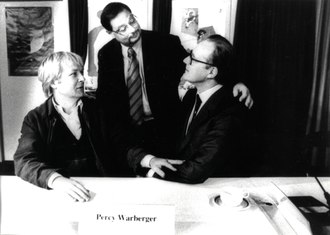Percy Warberger

1995 at a reading by Otto Stender in the Georgsbuchhandlung , Hanover
Percy Warberger is the shared pseudonym of the authors Harald Eggebrecht , Sten Nadolny and Michael Winter . Under the community pseudonym they wrote the features novel Das große Spiel or In the Thicket of Desires , which appeared in 53 episodes in the features section of the Süddeutsche Zeitung in 1994/95 and was then published as a book edition by Albrecht Knaus Verlag in Berlin .
In the experiment, the three authors who were friends, a novelist ( The Discovery of Slowness ) and two feature section journalists, resorted to the literary tradition of the sequel, which Eugène Sue had founded 150 years earlier with The Secrets of Paris , and transferred it to a colportage novel that deals with the daily news of major European cities. The main character of the novel is an antique dealer named Jonas Markstein, who is on the run after a burst water pipe and is single-handedly fighting a mafia of arms dealers.
At the beginning the three authors wrote three beginnings of the novel, of which the column editor Johannes Willms chose one. Then they alternated with the episodes, where everyone had to start at the end of the previous author, but was completely free in the further development of the story. This led to numerous twists and turns in the plot, ironic parodies of the style of colleagues and a special pleasure in letting their favorite characters die, which is why only a few characters made it to the end of the novel. According to Lutz Hagestedt , Ernst Augustin also contributed a “cabinet piece” to the colleagues' collective novel.
For Harald Eggebrecht, the end result is a “real newspaper novel”, which is characterized by its lack of depth of field. Michael Winter summarized: "A novel about love and sin and murder and very horrible things". Sten Nadolny described a Bildungsroman in the course of which a naive hero gets to know the world. Because a serial must constantly announce lurid future events, it reminds you of "the shop window of an erotic club". However, he also restricted: "Several people prevent great literature".
In his review, Martin Römlein spoke of a “fast-paced, cheerful, ironic and shameless tabloid comedy” that managed to “penetrate into the living room of the educated bourgeoisie”, as well as a postmodern novel with “politically and literarily completely incorrect twists, with deceit and an enormous potential for malice and imagination ”. Friedmar Apel read “a wild story full of world literary allusions and ironic historical self-reflection”, but also couldn't break the impression that “the musicians had more fun than the listeners.” According to Annette Meyhöfer, many readers were desperate of the southern Germans despite the flashbacks to previous events at the twists and turns of the sequel. The plot can only be understood in the book edition. But even this soon disappeared from the book market. Since then there has been no further collaboration under the pseudonym Percy Warberger.
expenditure
- The big game or in the thicket of desires . Knaus, Berlin 1995, ISBN 3-8135-4006-5 .
- The big game . Goldmann, Munich 1997, ISBN 3-442-43764-4 .
Web links
- Literature by and about Percy Warberger in the catalog of the German National Library
Individual evidence
- ↑ a b c Friedmar Apel : A secret for Munich . In: Frankfurter Allgemeine Zeitung of June 13, 1996.
- ↑ a b Martin Römlein: Ironic game for three . In: Neues Deutschland from November 18, 1995.
- ↑ a b c d e Annette Meyhöfer: The curse of faxes . In: Kulturspiegel of October 30, 1995.
- ↑ Percy Warberger: The great game or In the thicket of desires . Knaus, Berlin 1995, ISBN 3-8135-4006-5 , p. 279.
- ↑ Lutz Hagestedt : Beautiful Occident. The narrator Ernst Augustin turns 80 and is honored with a work edition. . In: Literaturkritik.de of October 2, 2007.
- ↑ Thomas Anz, Heike Glindemann, Lutz Hagestedt, Alexandra Pontzen and André Schwarz: Children, how time flies. The fastest book in the world took its time . In: Literaturkritik.de from April 1, 2003.